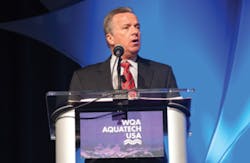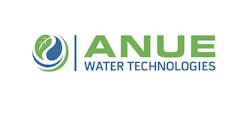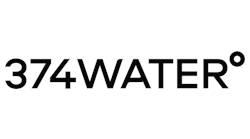Before heading to one of the industry's biggest annual events, WQA Aquatech USA 2014, we caught up with WQA's current CEO Dave Haataja to find out the organization's goals for the show and the upcoming year. We talked to Haataja just six months after he was appointed executive director of WQA and learned his plans for the organization in 2013. Here, we find out how these goals were fulfilled; learn about progress made in the areas of sustainability, education and legislative action; and find out what's in store for WQA Aquatech this year in Orlando.
Water Technology: In an interview with Water Technology a year ago, you said that you saw your role as executive director as "a conduit linking the priorities and needs of the water treatment industry to the resources of its trade association." Do you feel that you've been able to successfully make these connections in the past year? And, can you please provide examples.
Dave Haataja: Working with the WQA Board, we looked at what will help advance our industry and what will position the association to deliver more value. From this list we developed our strategic priorities and scrubbed it until we reached the “vital few” objectives. Like our members, we have finite resources and we must use them wisely. Let me share a couple of examples.
We are constantly working to communicate the value of water treatment to the public and policymakers. And, we enjoyed some considerable success with our methods and tools used over the years, including utilizing trade magazines such as Water Technology. We’ll continue with those efforts. One of the vital few objectives is to completely re-do our website, wqa.org, to be a source of information for those looking for water treatment solutions, be they consumers or businesses.
Responding to the call for a greatly improved education and professional certification program we launched a multi-year project to do just that. The first — and toughest — phases are soon to be behind us — on time and on budget. Pilot testing told us we did it correctly and we’ll launch the first course in March.
Advocacy is at the core of the value we bring the industry. Building on two successful Washington, D.C. visits last year, we continue strengthening relationships between WQA members and legislators in the capital. With a succinct list of issues, agencies and legislators, we are focusing our resources on what will make a difference for our members.
We are active at the state level too. Working with state and regional WQAs we have had some major accomplishments with policymakers. In California, after building a coalition of support, we helped shepherd through third-party certification. This is a major victory for our industry, helping move products more quickly and efficiently to the market in the largest state in the U.S. In Arizona, we have helped the state’s Salinity Committee focus on public education, best practices and efficiency.
WT: When you came on board, WQA's strategic planning involved focusing on member satisfaction. Do you feel that this focus has yielded tangible results in the past year?
DH: Recently, we completed a comprehensive and professional survey of members’ desires and satisfaction with the association. At the top of our agenda — the question we constantly ask ourselves — is whether we are giving WQA members what they are asking for. With survey results and as we meet members at WQA Aquatech USA and local meetings, we have been able to turn out a range of tangible benefits.
We also learned that our members are highly loyal to WQA, with the survey yielding a net promoter score of eight. While a solid net promoter score tells us we are doing a lot of things right, it also shows that there’s room for improvement. Accordingly, our members can expect even better things out of all of our programs in 2014, from technical and regulatory support to communications to product testing and certification.
WT: How has the advent of eco-labeling and sustainability changed the industry in the past year and how do you see it advancing into the future?
DH: Sustainability is one of the major themes we are facing. As more people and policymakers accept that water is a finite resource, water management in all its aspects will become the center of attention. Sustainability and eco-labeling go hand in glove. The one is really an extension of the other. I am confident that our new eco-labeling program is responding to the needs of the public, businesses and regulators.
WT: One notable event this year was the release of the Water Treatment for Dummies booklet. Can you talk about WQA’s involvement in that venture and how it fits in with the organization’s education focus?
DH: The Water Treatment for Dummies booklet is one of our prime examples of increasing awareness about the value of water treatment. Staff and a sizeable group of expert industry volunteers dedicated countless hours to the work. Written in lay language and easily available, it teaches the public that they do not have to tolerate water that is intolerable. Awareness and education in many respects are synonymous, successfully educating the public about water, its sources, contaminants and treatment options, positioning consumers to be knowledgeable purchasers of water treatment products and services.
WT: What are the biggest water treatment industry issues/problems or legislation/government challenges or opportunities you have had to deal with as executive director over the past year? What would you say the biggest issues in water treatment will be going forward into 2014?
DH: Recently, the Financial Times had an article about a small town in Australia that hasn’t had rain in two years. They are actually drawing up plans to completely evacuate and relocated the entire town. I see strong parallels to the drought in the southwestern United States. Drought and scarcity will drive the public and policymakers to take action to manage our water supply and water treatment is an important part of that equation.
The California third-party certification bill was both our biggest challenge and our biggest opportunity. By showing the state that third-party certification can provide the consumer protection that its policymakers demand, we help everyone doing business in California to get their products and services out faster. This is a success beyond California, giving us an example to show legislators throughout the nation.
On the legislative front, we are working with states such as Delaware and Wisconsin on septic tank issues and specialty licensees. As always, we continually seek to protect against unwarranted threats to our industry while we seek new opportunities. In California, we are pursuing a major legislative initiative to expand the use of POE/POU devices, particularly in disadvantaged communities. We are using a mix of public awareness, coalition building and lobbying. With success, a new California POE/POU law will help significantly advance our Final Barrier initiatives.
On the technological front are emerging technologies. As an industry we support and embrace innovation that is proven to be effective. This increasing array of solutions for water treatment brings a higher degree of specialization and is driving us to look at how we describe our products and what they are capable of in front of an increasingly sophisticated audience of users and regulators.
WT: How will this year’s WQA Aquatech show be different than past years? What are your expectations for the event?
DH: This is going to be a great convention. Our numbers in almost every category are up at this point, meaning more opportunity for networking, education and learning about new products and services. Through vibrant sessions, including a remarkable, keynote speaker, The New York Times best-selling author Charles Fishman, attendees will leave with an understanding of devices and services and also with knowledge about our industry. One crucial session will be an overview of the new Affordable Healthcare Act. We will be presenting a former Deputy Secretary of the United States Department of Health and Human Services, Eric Hargan, to discuss these realities and answer questions from the audience.


